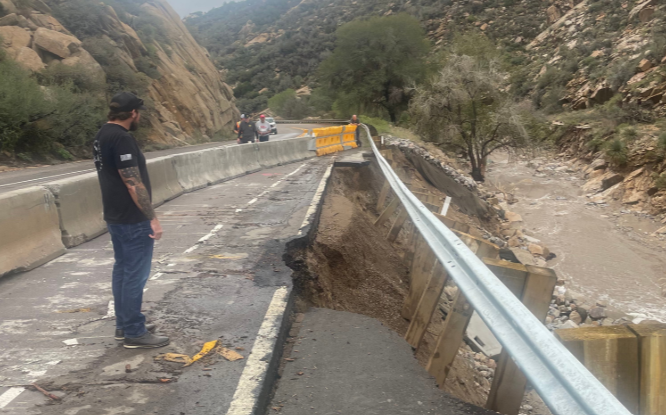
by Matthew Holloway | Oct 14, 2025 | News
By Matthew Holloway |
With tropical storm-fueled rains hammering various parts of Arizona and flood losses mounting, the U.S. Small Business Administration (SBA) announced that low-interest loans are now available for the victims of severe flooding in Coconino, Gila, Graham, Maricopa, Navajo, Pinal, and Yavapai Counties, as well as tribal nations.
The SBA is offering low-interest federal disaster loans to eligible businesses, nonprofits, residents, and tribal nations—similar to those provided for the Dragon Bravo Fire victims in September.
In a post to X announcing the relief for Gila County, Congressman Eli Crane (R-AZ02) called for continued prayers for those hit by the massive flooding. Remnants of Hurricane Priscilla hammered the area over the weekend, adding to late September’s monsoon deluge that devastated Globe-Miami.
Crane wrote: “@SBAgov has declared an economic disaster due to the severe flooding in Gila County. Through this declaration, SBA’s Economic Injury Disaster Loan (EIDL) program is available to eligible businesses, private nonprofits, and residents,” providing a link to resources.
He followed up: “Please continue to keep those impacted by the devastating floods in Gila County in your prayers. For those affected, @SBAgov is offering Business Physical Disaster Loans, Home and Personal Property Loans, and Economic Injury Disaster Loans.”
According to the SBA:
“Businesses and nonprofits are eligible to apply for business physical disaster loans and may borrow up to $2 million to repair or replace disaster-damaged or destroyed real estate, machinery and equipment, inventory, and other business assets.
“Homeowners and renters are eligible to apply for home and personal property loans and may borrow up to $100,000 to replace or repair personal property, such as clothing, furniture, cars, and appliances. Homeowners may apply for up to $500,000 to replace or repair their primary residence.
“Applicants may be eligible for a loan increase of up to 20% of their physical damage, as verified by the SBA, for mitigation purposes. Eligible mitigation improvements include insulating pipes, walls and attics, weather stripping doors and windows, and installing storm windows to help protect property and occupants from future disasters.”
The Economic Injury Disaster Loan (EIDL) program is also available to help small businesses, nurseries, and non-profit organizations with financial losses directly related to this disaster.
For more information, the SBA directs victims to visit this website. They can apply online, call SBA’s Customer Service Center at (800) 659-2955, or email disastercustomerservice@sba.gov.
“When disasters strike, SBA’s Disaster Loan Outreach Centers play a vital role in helping small businesses and their communities recover,” Chris Stallings, associate administrator of the Office of Disaster Recovery and Resilience at the SBA, said in a press release. “At these centers, SBA specialists assist business owners and residents with disaster loan applications and provide information on the full range of recovery programs available.”
Matthew Holloway is a senior reporter for AZ Free News. Follow him on X for his latest stories, or email tips to Matthew@azfreenews.com.

by Warren Petersen | Oct 13, 2025 | Opinion
By Sen. Warren Petersen |
Recently, the District of Columbia Court of Appeals Board of Professional Responsibility recommended the most drastic punishment—disbarment—for former U.S. Assistant Attorney General Jeff Clark over his private strategic counsel in the aftermath of the 2020 election. This complaint was pushed by liberal activists, showing the lengths they will go to punish individuals by going after their livelihoods despite the clear lack of criminal, unlawful, or unethical behavior.
Even past Attorneys General – William Barr, Jeff Sessions, and Michael Mukasey – filed an amicus brief to push back against this “dangerous precedent,” writing, “Disciplining Mr. Clark would open the door to charging federal lawyers with ‘dishonesty’ or ‘attempted dishonesty’ for statements made during oral arguments, theories in briefs, legal advice provided in memoranda, or even (as here) proposals in privileged internal draft documents and discussions. Such acts of political retribution would severely discourage lawyers from serving in the federal government and invite extraordinary dysfunction as federal lawyers constrain the advice they provide for fear of political retaliation by the Bar.”
Over the past decade, radical politicians and interest groups have weaponized the key to attorneys’ livelihoods over partisan disputes, as in Clark’s matter before the DC Appeals Board. These parties seek to bring their vengeance on conservative attorneys’ bar licenses, which allow them to do their jobs and provide for themselves and their families. The obvious intent of these attacks—which echo other attacks from the left such as debanking conservatives, voting against company directors, and threatening doctors’ licenses—is to terrorize and chill any conservative voices.
Attorneys are one of the most important groups to protect from these attacks because their entire job is to open the courthouse doors for their clients; if they are chilled by the left from representing certain groups, those groups will lose their constitutional rights to access the courts and have their causes zealously argued or even to receive legal advice in the first place. Simply put, if our nation is to exist in a society where attorneys feel free to perform the services their clients expect and deserve, we must enhance the protections for their licenses – especially from outside agitators who have no business engaging in this interference.
Perhaps no greater example can be found of this abuse of our judicial system than after the 2020 election in Arizona, when two respected attorneys found themselves facing legal complaints for their work to represent the Arizona Republican Party, as political officials across the country worked to hash out challenges to the hotly contested General Election. The most insidious part of the claims against these men wasn’t simply about the filings, but that a New Jersey Congressman, U.S. Representative Bill Pascrell, led the official accusations.
Most people, regardless of their understanding of our legal system, can apply good-old-fashioned common sense to conclude that lawsuits must be waged between two sides with a substantial nexus to the alleged misconduct. Yet, Pascrell had no connection to the case. He filed a complaint against the Arizona-based attorneys, which was ultimately dismissed. However, the damage was done to these attorneys’ reputations because of their fight to beat the frivolous charges from an unconnected, unhinged, partisan Democrat thousands of miles away.
Whether you agree or disagree with the efforts to extend litigation in the courts in the aftermath of the 2020 election, it is uncontestable that the left and their allies grossly abused their powers to assault, undermine, and intimidate attorneys who were attempting to do their jobs within a legal system enshrined by the American Constitution and laws. These tactics were experienced across the country, as President Trump and Republican-affiliated attorneys – like Jeff Clark – found themselves not only defending their clients but their livelihoods against increasingly personal and vicious attacks – from parties that, again, had no direct interest or tie to the case.
This reality was also seen more recently in the State of Montana, where dozens of charges were leveled against the Attorney General, the honorable and respected Austin Knudsen. The allegations were, in part, brought against Montana’s Attorney General for exercising his First Amendment right to criticize justices on the state’s Supreme Court as he worked to execute his constitutionally appropriated responsibilities to the people and legislature. Again, what was most egregious about this case was that one of the earliest steps was an ethical complaint being lodged by a California-based attorney – hundreds of miles away from the action. Because of this complaint, Attorney General Knudsen is now fighting a serious suspension that could complicate his abilities to represent Montanans.
These cases, and plenty more, are why I have been working on legislation in Arizona to protect well-meaning, law-abiding, and ethical attorneys from fear of reprisal from outside radical left agitators. If eventually passed and signed into law, the bill would mandate [is it now law now? – no] that the State Bar of Arizona and the Supreme Court immediately dismiss all complaints against attorneys, where the complainant does not have an attorney-client relationship with the attorney or another substantial nexus to the attorney’s alleged violation or conduct, and where it is clear that the complaint is simply a difference of political opinion. In addition, I collaborated with the Arizona Supreme Court to change its rule that had allowed this persecution to take place. This reform is necessary for many good conservatives who deserve to work their profession without fear of political persecution. I’m grateful that the court made the right decision to strike the balance of protecting the public from bad attorneys while defending good attorneys from frivolous complaints.
If the events of the past decade, as our nation becomes more politically polarized, have taught us anything, it is that we must guard the legal profession to ensure that bad actors are not permitted to chase away good attorneys who are committed to doing their jobs. Not everyone will agree with the cases those attorneys assume — and that’s okay. Our nation’s judicial system, which allows parties to peacefully work out their disagreements, is part of what makes our nation the envy of the entire world. We should resolve to defend this proud institution from nefarious agitators who must not be allowed to interfere with or manipulate our hallowed judicial system.
Warren Petersen is the President of the Arizona State Senate and represents Legislative District 14.

by Matthew Holloway | Oct 13, 2025 | Education, News
By Matthew Holloway |
As enrollment dips and two schools are considered for repurposing, Scottsdale Unified School District (SUSD) is promoting a biking event for “girls, nonbinary youth, and gender-expansive” children in family-facing communications.
In an October 9th post to X, parental rights organization Scottsdale Unites for Educational Integrity (SUEI) wrote: “Parents confirmed @ScottsdaleUSD is using their district-wide communication system to promote an event for ‘nonbinary youth’ and ‘gender expansive’ children. Girls in Gear (and apparently boys, too) claims that these lessons are Social Emotional Learning. Email: GovBRD@SUSD.org.”
The “Girls in Gear” program, which focuses on cycling skills and social-emotional learning, includes participants who identify outside traditional gender norms, according to a district email sent to families. A post on X by SUEI shared the event flyer, which lists the inclusive criteria.
According to the Girls in Gear website, the event “is open to any rider who identifies as a girl. If a rider identifies as a girl, then the rider is welcome to participate in Girls in Gear.”
In a reply to the SUEI post, Arizona Women of Action drew attention to the contradiction that SUSD is continuing to focus on gender ideology despite reduced enrollment, school closures under discussion, and at-risk federal funding.
Arizona Women of Action wrote in its reply:
“1. Identifying as a gender that is not innate (boy or girl) is often the first step of the ‘trans’ path. By Scottsdale Unified recognizing these identities (non-binary, gender expansive) the district can contribute to a child’s ‘trans’ path. Change in pronouns and presentation are next, irreversible puberty blockers and hormones follow.
2. This is no longer a girls’ event if non binary or gender expansive youth can participate.
3. SUSD is closing schools. This kind of choice could be a contributing factor to low enrollment.
4. Isn’t there an EO about this? Yes. And schools can lose federal funding.”
The organization also called up on followers to call “the U.S. Department of Education’s Office for Civil Rights (OCR) at 1-800-421-3481 to report non-compliance.”
District reporting in February revealed that under SUSD Superintendent Dr. Scott Menzel, enrollment has consistently dropped. As of February 2025, enrollment stood at 19,367, a decrease of 390 students from 2024, down 355 from the previous year. Over the past seven years, enrollment has dropped precipitously by 13%, from 22,608.
In response to the enrollment trends, the SUSD governing board voted 3-2 on October 7th to advance a proposal to repurpose Echo Canyon K-8 School and Pima Elementary School for the 2026-27 school year, according to AZ Family. Menzel addressed the looming closures with families in a September message and cited under-enrollment at both schools.
The promotion of the program also comes amid federal policies addressing gender-related content in schools. President Trump’s Executive Order 14190, issued January 29, 2025, directs the withholding of federal funds from K-12 programs that promote gender ideology or other specified materials, and reestablishes the 1776 Commission for patriotic education. Additionally, a Department of Health and Human Services directive on August 26, 2025, requires states to certify that sex education programs do not reference transgender youth or gender ideology to receive funding, affecting 46 states and territories, including Arizona. Several Democratic-led states have filed lawsuits challenging the directive. Despite pending legal action, the Executive Order and HHS Directive both remain in effect at present.
SUSD has previously addressed transgender-related policies, including student transition plans and LGBTQ curriculum, and run afoul of the Arizona Department of Education and parents alike. In prior incidents, the district faced questions over notifications to parents and the use of school spaces for related activities, such as a “sexuality-safe-space” at Mohave Middle School, as reported by the Arizona Daily Independent.
Last month, a BrainPOP lesson on LGBTQ topics prompted review under state DEI restrictions, with Superintendent of Public Instruction Tom Horne citing potential violations.
Other community responses in the thread include comments from users expressing concern over the event’s inclusivity and district priorities.
Matthew Holloway is a senior reporter for AZ Free News. Follow him on X for his latest stories, or email tips to Matthew@azfreenews.com.

by Ethan Faverino | Oct 13, 2025 | Economy, News
By Ethan Faverino |
In a landmark victory for small businesses, Congress has made the 20% Small Business Tax Deduction, also known as Section 199A, a permanent qualified business deduction, ensuring long-term tax certainty for Main Street.
This critical provision allows small businesses to deduct up to 20% of their income, empowering mom-and-pop shops to grow, invest in their workforce, and play their part in giving back to the community.
The decision, signed into law by President Trump, averts a massive tax hike that would have impacted over 33 million small business owners nationwide at the end of 2025.
Making the Small Business Tax Deduction permanent changes the game for Main Street. The tax certainty provided by Congress ensures small businesses can thrive, hire more workers, and compete with larger corporations.
Since its introduction in 2017, the deduction has leveled the playing field for nine out of ten small businesses that file as pass-through entities. Recent NFIB surveys show growing confidence, with small business optimism reaching a five-month high.
The new tax law also includes pro-small business provisions, such as permanent extensions of the 2017 marginal tax rates, preventing up to a 4% tax hike for small businesses and employees.
Enhanced expense and depreciation rules under Section 179 and 168(k) enable business owners to confidently invest in growth, such as making large purchases. Additionally, increased reporting thresholds for IRS forms 1099-K, 1099-NEC, and 1099-MISC reduce paperwork burdens for businesses using platforms like Venmo or PayPal or engaging independent contractors.
The permanent estate tax exemption further supports owners looking to pass their businesses to the next generation or keep them locally owned.
National Federation of Independent Business (NFIB) State Director Chad Heinrich said, “An NFIB-commissioned study by EY found that the Small Business Tax Deduction will increase Arizona’s economic activity by more than $1.4 billion annually, resulting in the creation of 26,000 jobs each year. That means more, good-paying jobs for hardworking Arizonans.”
Ethan Faverino is a reporter for AZ Free News. You can send him news tips using this link.

by Jonathan Eberle | Oct 13, 2025 | Economy, News
By Jonathan Eberle |
A new study by Cinch Home Services has revealed that Arizona ranks among the top states in the nation for rising property values over the past decade, with home prices in the state increasing by more than 120% since 2015.
According to the analysis—which used Zillow’s Home Value Index to track average property prices between 2015 and 2025—Arizona ranks tenth overall, with an impressive 120.3% increase in average property value over the ten-year period. The state’s most dramatic growth occurred between 2021 and 2022, when home values surged 28.1% in a single year.
Arizona’s rise mirrors a broader national trend in which several western and southern states saw explosive growth during the early 2020s housing boom. The study found that many states experienced their steepest gains in the immediate aftermath of the COVID-19 pandemic when housing demand and home improvement projects spiked.
Leading the nation is Idaho, where property values jumped 156% over the decade—nearly doubling Arizona’s rate of growth. Utah followed with a 128.4% increase, while Washington, Florida, and Nevada rounded out the top five. Other high-growth states include Georgia, Tennessee, Maine, and New Hampshire, each seeing increases above 120%.
At the opposite end of the spectrum, Louisiana recorded the smallest increase in home values over the past ten years, at just 23.4%. A spokesperson for Cinch Home Services noted that the results highlight how local markets—not the national average—often drive housing trends.
“This study reveals something especially insightful: the housing market moves in local clusters as opposed to nationally,” the spokesperson said. “The biggest surprise was that between 2021 and 2022 saw the largest value jump across all states. One possible reason is that more people spent time at home in 2020 making improvements, then sold or reassessed their property’s value the following year.”
The spokesperson added that homeowners looking to boost their property’s worth should focus on “first impressions,” recommending improvements such as fresh landscaping, parking availability, or a new front door to enhance curb appeal.
Top 10 States for Property Value Growth (2015–2025)
- Idaho – 156%
- Utah – 128.4%
- Washington – 127.1%
- Florida – 125.3%
- Nevada – 124.4%
- Georgia – 122.5%
- Tennessee – 121.3%
- Maine – 121%
- New Hampshire – 120.7%
- Arizona – 120.3%
Jonathan Eberle is a reporter for AZ Free News. You can send him news tips using this link.





